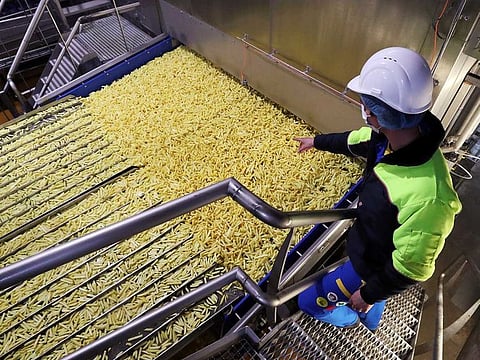COVID-19: Craving for fries? Belgium urges you to have a second helping
Tons of potatoes pile up in warehouses as coronavirus hits Belgian exports

Dubai: What does a country do if it has more than 750,000 tons of potatoes piled up in warehouses? Encourage the people to eat more potatoes, of course.
That is exactly what Belgium is asking its people to do.
"Let's all eat chips twice a week, instead of just once," urged Romain Cools, secretary general of the Belgium potato growers’ union Belgapom.
"In this way, part of the potato stock will still be used and we can avoid seeing excellent food, for which our farmers have worked so hard, being lost," Flemish Agriculture Minister Hilde Crevits told the Brussels Times.
Belgium is the world's top exporter of frozen potato products, including fries and crisps, sending them to more than 160 countries and providing a trade value of about $2 billion each year.
However, the coronavirus crisis has led to a surplus of potatoes in the small European country, as demand has slumped amid Belgium’s government-enforced lockdown, reports said.
The vast majority of the produce is exported and demand dried up as the food-service industry ground to a halt. Now hundreds of thousands of tons of potatoes risk being wasted as restaurants, festivals and other major buyers have stopped stocking up during the global pandemic, according to Belgium’s Department of Agriculture.
Since mid-March, restaurants in Belgium and many other markets for potato growers have closed. The cancellation of Belgium's many spring and summer festivals has added to their woes, reports said. International trade in potatoes has also been hit.
French region hit too
The potato crisis has also hit Hauts-de-France, the neighbouring French region that includes Calais, BBC reported. There, almost 500,000 tons of potatoes are still waiting for customers, and will most likely be lost.
“We’re working with supermarkets to see whether we can launch a campaign asking Belgians to do something for the sector by eating fries — especially frozen fries — twice a week during the coronavirus crisis,” Cools told CNBC. “What we are trying to do is to avoid food waste, because every lost potato is a loss.”
“To be very honest, the effect on potato consumption will probably last for months, and we can only try to find solutions where the solutions are — for us in Belgium, that could be pushing home consumption,” he said. “We’ve also asked farmers not to plant that many potatoes for the next season because we believe this season will take some extra months away from next year by postponing processing.”
Potatoes that could not be processed were being sent to food banks and exported to Central Europe and Africa, where there were shortages. Any produce left over after that was being made into animal feed or processed into biofuel, Cools told CNBC.
Sign up for the Daily Briefing
Get the latest news and updates straight to your inbox



